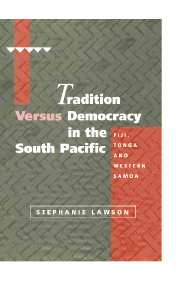Book contents
- Frontmatter
- Contents
- List of Maps
- List of Tables
- Preface
- Epigraph
- The South Pacific
- Introduction
- Chapter 1 Tradition and Democracy
- Chapter 2 Constitutional Development, Chiefly Power and the Politics of Tradition in Fiji
- Chapter 3 The Monarchy Versus Democracy in the Kingdom of Tonga
- Chapter 4 Preserving Tradition Through Democratization: The Introduction of Universal Suffrage in Western Samoa
- Chapter 5 Conclusion: Tradition Versus the West
- Notes
- Bibliography
- Index
Chapter 5 - Conclusion: Tradition Versus the West
Published online by Cambridge University Press: 22 September 2009
- Frontmatter
- Contents
- List of Maps
- List of Tables
- Preface
- Epigraph
- The South Pacific
- Introduction
- Chapter 1 Tradition and Democracy
- Chapter 2 Constitutional Development, Chiefly Power and the Politics of Tradition in Fiji
- Chapter 3 The Monarchy Versus Democracy in the Kingdom of Tonga
- Chapter 4 Preserving Tradition Through Democratization: The Introduction of Universal Suffrage in Western Samoa
- Chapter 5 Conclusion: Tradition Versus the West
- Notes
- Bibliography
- Index
Summary
European contact and imperial expansion in the South Pacific has left the countries in the region with a significant array of social, political, and economic legacies. Western religious beliefs, Western political and educational institutions, and integration into the global economy have been received with varying degrees of enthusiasm. With few exceptions, Christianity has probably had the greatest success in becoming established as a central element in the lives of Pacific Islanders – if we take church attendance and other external indicators of devotion as appropriate indicators. At the other end of the spectrum, and especially in the three countries considered here, Western democratic practices have been received with a great deal less ardour – at least among some significant sectors – despite the importance that elites in all three countries attach to the word ‘democracy’ as a regime legitimator. So although virtually all agree in a general sense that democracy is good (and that there ought to be more of it – in other countries), very different approaches to its institutionalization and values have been espoused by political leaders. External indicators, such as the adoption of constitutions, parliaments, electoral procedures, and so forth therefore cannot be accepted as proof positive of the unqualified acceptance of democracy and its values as the basis of the political system.
- Type
- Chapter
- Information
- Tradition versus Democracy in the South PacificFiji, Tonga and Western Samoa, pp. 160 - 174Publisher: Cambridge University PressPrint publication year: 1996



